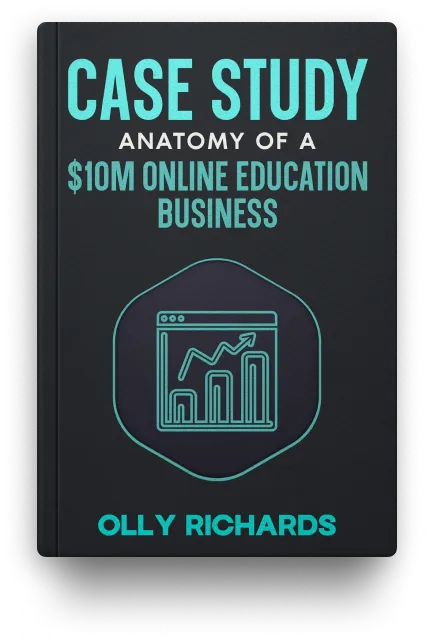Feels like I’m surrounded by people writing books.
Friends, mentees, students…
Everyone’s at it like rabbits.
Heck…
Even I’m starting a book in January.
(It’s highly classified. Top secret. So don’t even think about asking me about it.)
Now, it seems to me that there are two reasons people write books for their business:
- They can’t help themselves… they just looove writing
- It’s good for business
Obviously #1 has soul.
#2 is a marketing tactic.
When I started writing my language books back in 2015 (ish), I did it for a combinations of those reasons.
Kindle was huge at the time and it represented an interesting opportunity.
But also, I always loved writing.
So why not?
Felt like a good marketing experiment at the very least!
(And hey… 1.5 million copies later, it worked!)
Spotted in Waterstones, London this week
But what’s noticeable about 2025 is that book writing as a growth tool seems to be getting hoisted on everyone.
Lots of indie marketing publishers springing up, all vying for business.
Here’s what I think the game is:
If you’re a publisher, and you can persuade a new, up-and-coming personal brand to publish their book with you, you can effectively take a small equity stake in their career:
- they grow their brand
- they market their book
- you make money from their efforts
However, much like angel investing, publishers don’t expect every book to succeed.
Far from it.
Perhaps 1/10 books will break out.
As a consequence, publishers put ZERO money into promoting authors. Even the big ones.
(Even James Clear said as much when I met him in Nashville this summer. He had to do 100% of the marketing for Atomic Habits.)
Anyway…
There’s a point to this meandering intro.
I’m surrounded by educators writing books, and I’ve been thinking about when you should be “ready”.
Here’s the crux of the issue:
For the person reading your book, implementation is all on them.
You have no interaction with them.
No coaching calls.
No questions answered.
What this means for you is that you need to have confidence the contents of the book will get results when implemented.
Important:
This is not about the quality of the information.
Nor is it about what’s worked for you in your life.
Rather, does your system work when a reader implements it on their own?
It’s a teaching question, not a knowledge question.
To develop this, you need:
A teaching framework or mechanism that is robust and proven.
How do you develop this?
Answer… sequentially.
Here’s how:
Step 1:1-to-1 teaching or consulting. (Help people in-person so you can develop your method in practice.)
Step 2:Group coaching / cohorts. (Test your method at one step of remove. What problems come up? Fix the system so those problems don’t come up again.)
Step 3:Online courses. (Does your method still work when there is no live interaction at Where do people get into trouble? Fix that.)
Then…
Eventually…
Step 4:You might be ready to write the book.
By following this sequence, you get to refine your teaching to the point where you know it works at arm’s length.
At this point, a book makes sense.
Because now, you’ve pressure-tested your method to the point where students will actually get results with zero support.
It’s not luck — you’ve proven it.
And if it gets results, that’s when your book can take off.
Like Rob Fitzpatrick’s The Mom Test — a self-published book that gradually grew in popularity over 10 years to the point where it became a classic — it was genuinely useful, so people told their friends about it.
(Word-of-mouth makes classic books.)
So, if you want your book to actually succeed, the best thing you can do is make sure that the contents are bulletproof and battle-tested.
In case you’re curious, this is the exact process I’m going through right now.
I started this business personal brand back in 2023.
For the first year, I just worked with people 1-to-1 — seeing if I could help entrepreneurs grow their businesses, using the stuff I know.
In year two, I started running live events. Does my knowledge work in a small group setting?
Now, in year three, I’m running Elevate — a leveraged group programme which includes a blend of all these things: 1-to-1 strategy time, group sessions, recorded training, in-person events.
And let me tell you…
Only now, after almost 3 years, am I reaching the point where I feel my knowledge is robust enough that I can write a book about it and it will prove maximally useful.
My case study was “what worked for me”.
My next book will be “what works for others”.
Here’s the key thing:
Most of the stuff in the new book will be things I already knew. What’s different is the emphasis.
Things I know work for others people.
I know what to emphasise now.
What to omit.
What to harp on about (for good reason).
And it’s my hope that, because the information in this new books has been extensively tested in reality, with real businesses I’ve worked with and got results for, it stands a chance of making a genuine impact.
Anyway…
As I’m talking to other entrepreneurs about their books, it’s become apparent to me that many of them aren’t ready to write them.
So hopefully this helps someone zoom out and see their books in a wider context.
Namaste,
Olly

